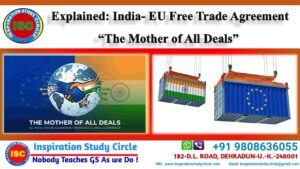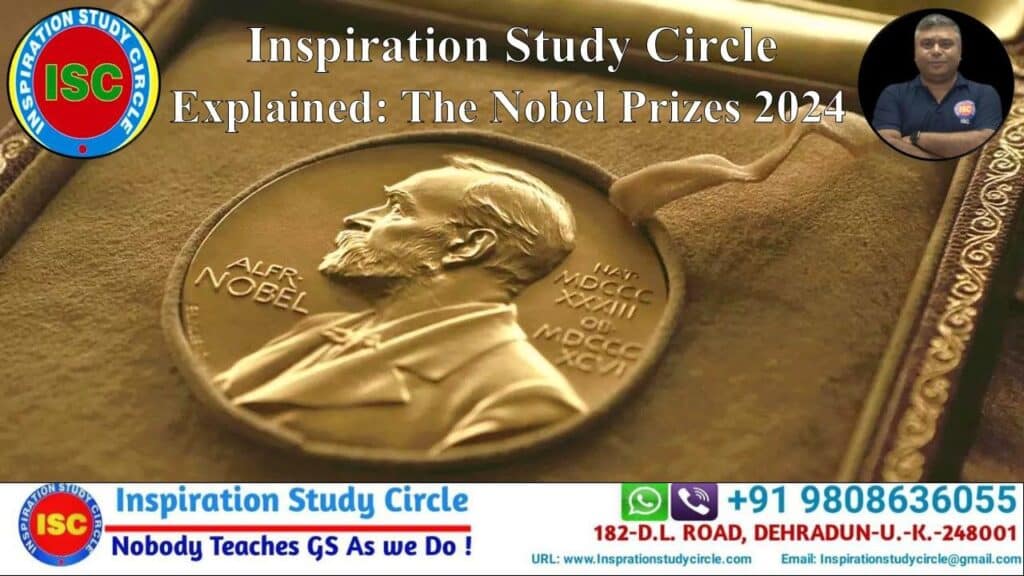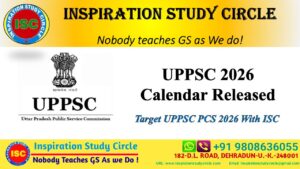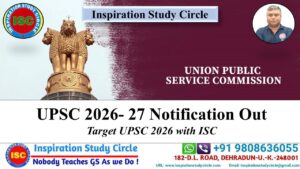
Explained: India- EU FTA “The Mother of All Deals”
Explained: India- EU FTA “The Mother of All Deals” Table of Contents India- EU FTA “The Mother of All Deals
The Nobel Prize rewards science, humanism, and peace efforts. This is one of the central concepts in the will of Alfred Nobel, and it also permeates the outreach activities that have been developed for the purpose of engaging, inspiring, and spreading knowledge about the Nobel Prize as well as the discoveries and achievements of the laureates.
The Nobel Prizes are five prizes awarded to those who, during the preceding year, have conferred the greatest benefit to humankind, as established by the 1895 will of Swedish chemist, engineer, and industrialist Alfred Nobel, in the year before he died. Prizes were first awarded in 1901 by the Nobel Foundation. Nobel’s will indicated that the awards should be granted in Physics, Chemistry, Physiology or Medicine, Literature, and Peace.
A sixth prize for Economic Sciences, endowed by Sweden‘s central bank, Sveriges Riksbank, and first presented in 1969, is also frequently included, as the Nobel Foundation also administers it. The Nobel Prizes are widely regarded as the most prestigious awards available in their respective fields.
The prize ceremonies take place annually. Each recipient, known as a laureate, receives a green gold medal plated with 24 karat gold, a diploma, and a monetary award. A prize may not be shared among more than three individuals, although the Nobel Peace Prize can be awarded to organizations of more than three people. Nobel Prizes are not awarded posthumously, but if a person is awarded a prize and dies before receiving it, the prize is presented.
The Nobel Prize, beginning in 1901, and the Nobel Memorial Prize in Economic Sciences, beginning in 1969, have been awarded 609 times to 975 people and 25 organizations. Five individuals and two organizations have received more than one Nobel Prize.
| The Nobel Prize in Physiology or Medicine was awarded in 1950 to researchers at the Mayo Clinic in Rochester, Minnesota. | |
| Awarded for | Contributions that have conferred the greatest benefit to humankind in the areas of Physics, Chemistry, Physiology or Medicine, Literature, Economics, and Peace. |
| Country | |
| Presented by |
|
| Reward(s) | A gold-plated green gold medal, a diploma, and a monetary award of 11 million. |
| First awarded | 10 December 1901; 122 years ago |
| Number of laureates | 621 prizes to 992 laureates (as of 2024) |

Their Work: They used physics to find patterns in information
This year’s laureates used tools from physics to construct methods that helped lay the foundation for today’s powerful machine learning. John Hopfield created a structure that can store and reconstruct information. Geoffrey Hinton invented a method that can independently discover properties in data, which has become important for the large artificial neural networks now in use.
Their Work: They cracked the code for proteins’ amazing structures
The Nobel Prize in Chemistry 2024 is about proteins, life’s ingenious chemical tools. David Baker has succeeded with the almost impossible feat of building entirely new kinds of proteins. Demis Hassabis and John Jumper have developed an AI model to solve a 50-year-old problem: predicting proteins’ complex structures. These discoveries hold enormous potential.
Their Work: Tiny RNAs with profound physiological importance
Victor Ambros and Gary Ruvkun discovered microRNA, a new class of tiny RNA molecules that play a crucial role in gene regulation. Their groundbreaking discovery in the small worm C. elegans revealed a completely new principle of gene regulation. This turned out to be essential for multicellular organisms, including humans. MicroRNAs are proving to be fundamentally important for how organisms develop and function.
Han Kang: for her intense poetic prose that confronts historical traumas and exposes the fragility of human life.
The Nobel Prize in Literature 2024 is awarded to the South Korean author Han Kang, “for her intense poetic prose that confronts historical traumas and exposes the fragility of human life.”
Her Work: In her oeuvre, Han Kang confronts historical traumas and invisible sets of rules and, in each of her works, exposes the fragility of human life. She has a unique awareness of the connections between body and soul, the living and the dead, and in her poetic and experimental style has become an innovator in contemporary prose.
Nihon Hidankyo: for its efforts to achieve a world free of nuclear weapons and for demonstrating through witness testimony that nuclear weapons must never be used again.
His Work: Powerful International Norm Stigmatising Nuclear Weapons
The grassroots movement of atomic bomb survivors from Hiroshima and Nagasaki, also known as Hibakusha, is receiving the Nobel Peace Prize for its efforts to achieve a world free of nuclear weapons and for demonstrating through witness testimony that nuclear weapons must never be used again. The extraordinary efforts of Nihon Hidankyo and other representatives of the Hibakusha have contributed greatly to the establishment of a nuclear taboo.
Their Work: They explained why some countries are rich and others poor
This year’s laureates have provided new insights into why there are such vast differences in prosperity between nations. One important explanation is persistent differences in societal institutions. By examining the various political and economic systems introduced by European colonizers, Daron Acemoglu, Simon Johnson, and James Robinson have been able to demonstrate a relationship between institutions and prosperity. They have also developed theoretical tools that can explain why differences in institutions persist and how institutions can change.
Alfred Nobel was an inventor, entrepreneur, scientist, and businessman who also wrote poetry and drama. His varied interests are reflected in the prize he established and which he laid the foundation for in 1895 when he wrote his last will, leaving much of his wealth to the establishment of the prize.
Since 1901, the Nobel Prize has been honoring men and women from around the world for outstanding achievements in physics, chemistry, physiology or medicine, literature, and for work in peace.
The last will and the testament
Alfred Nobel signed his last will in Paris on 27 November 1895. He specified that the bulk of his fortune should be divided into five parts and to be used for prizes in physics, chemistry, physiology or medicine, literature, and peace to “those who, during the preceding year, shall have conferred the greatest benefit to humankind.”
1. Inventing dynamite: Based on Alfred’s work and patents a whole new industry developed. Within ten years, 16 explosives producing factories had been founded in 14 countries with Nobel as a shareholder or co-owner
2. Interest in literature: Alfred Nobel also had a big interest in literature and writing. He left behind a private library at Björkborn with over 1,500 volumes, among those works by many great writers of the 19th century.
3. A long list of inventions: Alfred invented dynamite and experimented with making synthetic rubber, leather, and artificial silk among many other things. During his lifetime he acquired 355 patents worldwide.
The Nobel Foundation is a private institution founded on 29 June 1900 to manage the finances and administration of the Nobel Prizes. The foundation is based on the last will of Alfred Nobel, the inventor of dynamite. It also holds Nobel Symposia on important breakthroughs in science and topics of cultural or social significance.
It is tasked with a mission to manage Alfred Nobel’s fortune and has ultimate responsibility for fulfilling the intentions of Nobel’s will. For more than a century, these academic institutions have worked independently to select Nobel Prize laureates.
Several outreach organizations and activities have been developed to inspire generations and disseminate knowledge about the Nobel Prize.
The Nobel Foundation was founded as a private organization on 29 June 1900 specifically to manage the finances and administration of the Nobel Prizes. It is based on Nobel’s last will. At the time Nobel’s will led to much skepticism and criticism and thus it was not until 26 April 1897 that his will was approved by the Storting. Soon thereafter they appointed the members of the Norwegian Nobel Committee that was to award the Peace Prize. Shortly after, the other prize-awarding organizations followed; Karolinska Institutet on 7 June, the Swedish Academy on 9 June, and the Royal Swedish Academy of Sciences on 11 June. In 1900 the Nobel Foundation’s newly created statutes were promulgated by King Oscar II.
In 1905 the Union between Sweden and Norway was dissolved which meant the responsibility for awarding Nobel Prizes was split between the two countries. Norway’s Nobel Committee became the awarder of the Peace Prize while Sweden became the awarder of the other prizes.
Following Nobel’s will, the primary task of the Nobel Foundation is to manage the fortune Nobel left after him in a fund. The Nobel Foundation also represents the Nobel Prize to the outside world and takes charge of informal activities and issues related to the awarding of the Nobel Prizes. The Nobel Foundation is not involved in the process of selecting the Nobel laureates. The Nobel Foundation invests money to maintain a funding base for the prizes and administrative activities. The Nobel Foundation is exempt from all taxes in Sweden (since 1946) and from investment taxes in the United States (since 1953).
Apart from the board, the Nobel Foundation is made up of the prize-awarding institutions (the Royal Swedish Academy of Sciences, the Nobel Assembly, the Swedish Academy, and the Norwegian Nobel Committee), the trustees of the prize-awarding institutions, and auditors.
In 1965, the foundation initiated the Nobel Symposia, a program that holds symposia “devoted to areas of science where breakthroughs around the world are occurring or deal with other topics of primary cultural or social significance.”
The symposia have covered topics such as prostaglandins, chemical kinetics, diabetes mellitus, string theory, cosmology, and the Cold War in the 1980s. The Nobel Symposium Committee consists of members from the Nobel Committees in Chemistry, Literature, Peace, Physics, and Physiology or Medicine; the Prize Committee for Economics; the Bank of Sweden Tercentenary Foundation; and the Wallenberg Foundation.
Disclaimer: the above information is taken from the websites: nobelprize.org and Wikipedia.

Explained: India- EU FTA “The Mother of All Deals” Table of Contents India- EU FTA “The Mother of All Deals

UPPSC- 2026 Calendar Released Table of Contents UPPSC- 2026 Calendar Released Brought to you by Inspiration Study Circle UPPSC- 2026

Inspiration Study Circle: UPSC CSE 2026 Notification Out Table of Contents Inspiration Study Circle: UPSC CSE 2026 Notification Out UPSC

Explained: Union Budget 2026- 27 and the Economic Survey 2025-26 Table of Contents Union Budget 2026- 27 and the Economic

Target UPSC 2026: Best UPSC 2026 Coaching Table of Contents Inspiration Study Circle- Best UPSC 2026 Coaching UPSC Exam 2026

UPSC 2026 Notification Postponed Table of Contents UPSC 2026 Notification Postponed UPSC Exam 2026 is an All-India Civil Services Exam